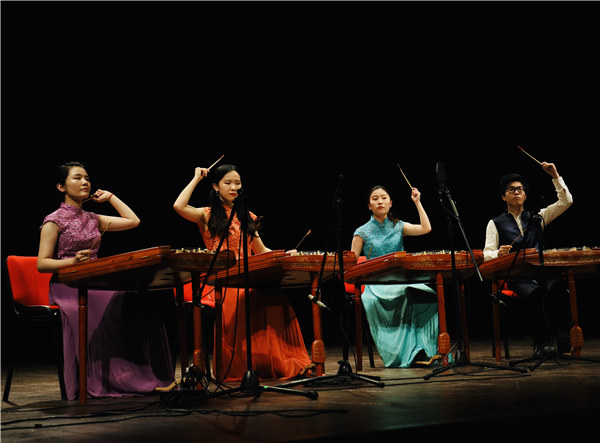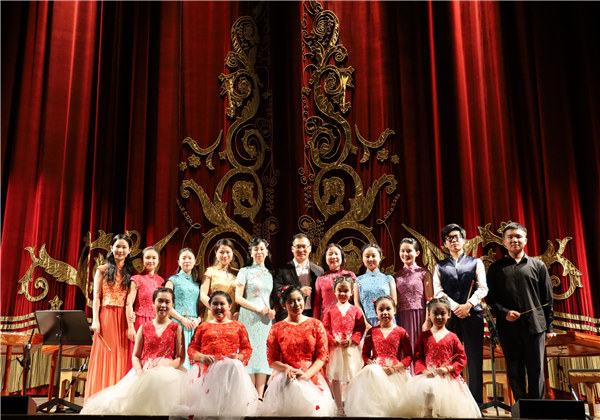
From the People's Daily app.
And this is Story in the Story.
The zither, otherwise known as the yangqin in China, is believed to have arrived from the Persian Empire through the Silk Road about 400 years ago, in the late Ming Dynasty (1368-1644).
The word “yangqin” means “foreign instrument,” and it gradually took a central role in Chinese folk ensembles.
Ever since its emergence, it has been favored by scholars and intellectuals due to its subtlety and refinement.
Overseas, musicians work with local schools where they teach students Chinese music appreciation courses and basic training in folk instruments.
At a nursing home in Denmark, yangqin musicians have been experimenting with Chinese folk music as a form of therapy to help treat Alzheimer's patients.
Today’s Story in the Story looks at the yangqin, a traditional music instrument, and how it has been preserved and is being passed down, to younger generations at home and abroad.

The third International Dulcimer Music Festival in Beijing marked a departure, being the first time the event had been held outside the United States. (Photo: China Daily)
Introducing the yangqin's charms to the world is something that Liu Yuening, a professor and doctoral supervisor at the Central Conservatory of Music in Beijing, has made her mission for more than 30 years.
Looking back, she says, pursuing that task seems to have been her destiny.
Liu was nine years old when she was introduced to the instrument through a family friend who was an avid player.
"The yangqin is so much more than simply a Chinese traditional musical instrument. It has this universal quality and can have a really profound impact in the modern era,” Liu explained.
Liu sees herself as one of the first beneficiaries of China's reform and opening-up. She was enrolled in the Central Conservatory of Music Middle School immediately after changes in education in 1977.
"Music can foster peace and friendship, and bring people from different countries together," Liu said. "I feel this is an important role for music. In working to promote the yangqin I've made many friends."
Musicians usually needed to master several folk music instruments and sing while playing, which became a characteristic unique to the Sichuan school.

The third International Dulcimer Music Festival in Beijing marked a departure, being the first time the event had been held outside the United States. (Photo: China Daily)
Fu Bing, 74, is a key figure at the Sichuan school of yangqin. He picked up the instrument when he was 9, and for more than half a century has had an agenda similar to that of Liu, working to preserve the instrument’s history and culture.
When he was 20, he joined the Folk Art Troupe of Chengdu. Though he had two performances every day, he kept practicing yangqin whenever he could, often late into the night, covering the instrument with a piece of cloth so as not to disturb his neighbors.
"In 1976 I bought a cassette recorder that cost $113. It took me about five years to save for that recorder,” he shared.
In 1988 he finally completed his oral history project - a term he said he was not even aware of at the time. On 278 cassettes he recorded the voices of 40 or so blind folk musicians, all of whom have since died.
"Knowledge doesn't belong to one person; it belongs to mankind. We must preserve it and share the resources we have so we can pass them down to ensuing generations," he said.
In 2012 in conjunction with the Royal Danish Academy of Music, the Central Conservatory of Music established the world's first Music Confucius Institute in Copenhagen.
Mi Xuanye, a young but experienced teacher at the Music Confucius Institute, has been working with the conservatory in overseas cultural exchanges and yangqin education since she studied for a master's degree at the conservatory between 2014 and 2016.
Mi said yangqin music, with its pleasant sound, cultural background and the instrument's resemblance to other countries' folk instruments, can attract people from outside China to learn about Chinese folk music.
"The most important thing is that the yangqin represents Chinese folk culture with all its refinement. The music itself is attractive enough, but we need to do more to let people know about it," she said.
After receiving training from Alzheimer's disease experts, the Chinese musicians used folk instruments to perform classic Danish tunes that patients might have been familiar with from their childhood.
Mi explained that during performances, they would observe their reactions to the music and make adjustments accordingly.
"Often after a half-hour session, some of the people would be crying. In one case a man kept asking us all sorts of questions, and the care providers told us that before we came, he could barely talk,” Mi said.
(Produced by Nancy Yan Xu, Lance Crayon, Brian Lowe and Da Hang. Music by: bensound.com. Text from Global Times and China Daily.)


